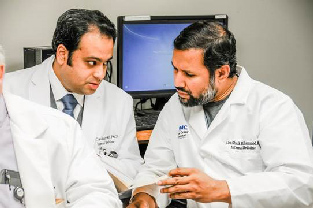Evaluation and Feedback
Evaluation Narrative
Advisors
Each resident is assigned a faculty member as an advisor for mentoring. The residents and advisors (or Program Director/APD) have formal meetings a minimum of twice year where the Clinical Competency Committee milestones ratings for the resident are discussed with the resident. Advisors and residents also discuss career plans and the resident’s general wellness as it relates to their work and personal lives. However, residents and their advisors may meet frequently if choose to do so.
Clinical Competency Committee (CCC)
This committee reviews all evaluation data available for each resident in training (rotation evaluations, examination scores [excluding the ITE], unsolicited complaints and praise (from nurses, social workers, patients, etc.) and then assigns the appropriate score for each milestone for the resident. The milestones have been created by the ACGME and the program must report them twice yearly to the ACGME for each resident in the program. The milestones fall into 6 major categories with multiple milestones in each category. The categories are: Medical knowledge, Patient care, Professionalism, Interpersonal communication skills, Practice based learning and improvement and System based learning and improvement.
Scholarly Activity
The ACGME mandates that residents showcase scholarly activity throughout their training. During the PGY-1 year, all residents will develop an abstract and corresponding poster based on an intriguing patient encounter during their training. We strongly encourage PGY-1 residents to submit their abstracts for presentation at local conferences, as well as the Michigan Chapter of the ACP and National ACP meetings. PGY-2/3 residents are also invited to submit abstracts to the aforementioned meetings. Additionally, they are required to present a resident grand round and a resident journal club at a Sinai-Grace resident conference. The quality of scholarly work is a significant component of the evaluation process conducted by the CCC.
Transitional Meetings
These meetings are held monthly. The CMRs, the program directors, core faculty and the education coordinator meet with the Transitional class to disseminate information to the residents and to get feedback from the residents about the Training Program.
Suggestion Box
There are confidential web-based drop boxed that allows anonymous messages to be sent to the program. Additionally, confidential suggestion boxes are located throughout the department where messages can be left for the department.
Access to Faculty
All faculty members, for the most part, have an open-door policy for the residents in the training program. If a faculty member is not immediately available for a meeting, an appointment can usually be made within one to two days to meet.
Mental Health and Substance Abuse and Well-Being
When a resident is suspected of having a mental illness or substance abuse, the resident is referred to a mental health or substance abuse specialist either through their medical insurance or a psychiatrist here at Sinai-Grace for an evaluation. The Program Director makes decisions about a leave of absence or continuing in training with accommodations in consultation with the selected mental health expert and the resident involved. When a plan for the resident is put into place, it is clearly defined that a report(s) back to the Program Director will occur solely for the purposes ensuring that the resident can work in the capacity of a resident safely. Other aspects of mental health care are protected health information, and the resident need not share this with the Program Director.
How we measure our success
Report Card
The Internal Medicine program and Transitional Program will be benchmarked against the eight other medicine programs in southeast Michigan because of their relevance to the city of Detroit. The program will measure its success and effectiveness in the following areas:
Resident Indicators
Diversity of the resident body
Resident/graduate satisfaction with the learning experience
National board test scores
Resident involvement in service
Resident involvement in research
Level of mentoring residents receive
Faculty Indicators
Excellence in teaching
Conference presentations
Innovation in dissemination of resident knowledge
Retention of residents and faculty
National pool of applicants
Service activity
Diversity of teaching methods
Community Indicators
Collaborative relationships with service settings
Collaborative relationships with other health and human service disciplines


